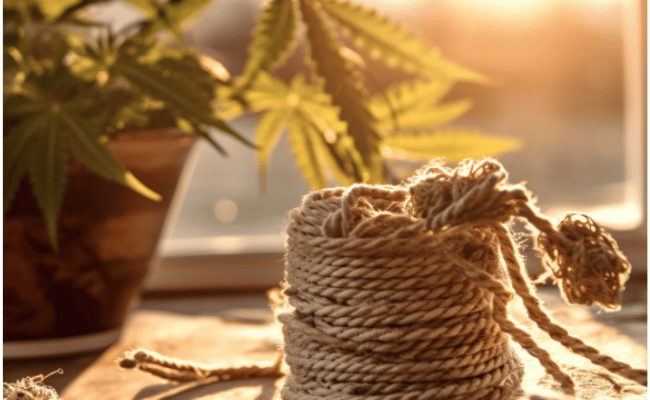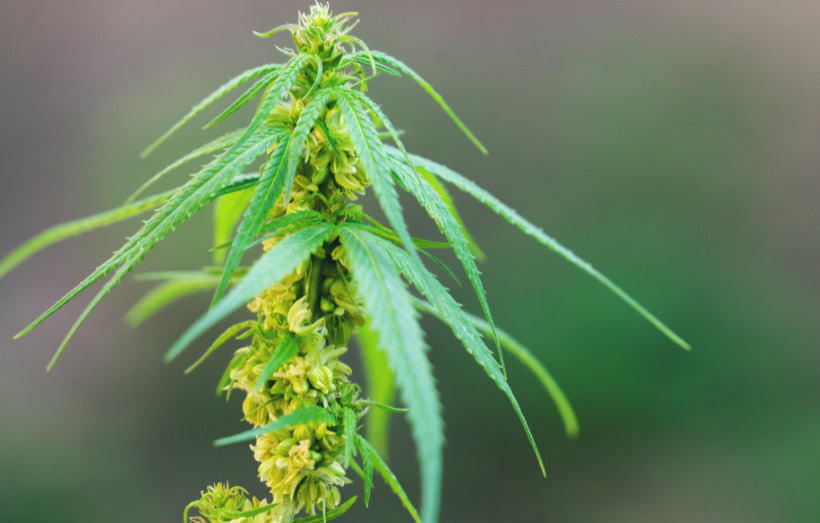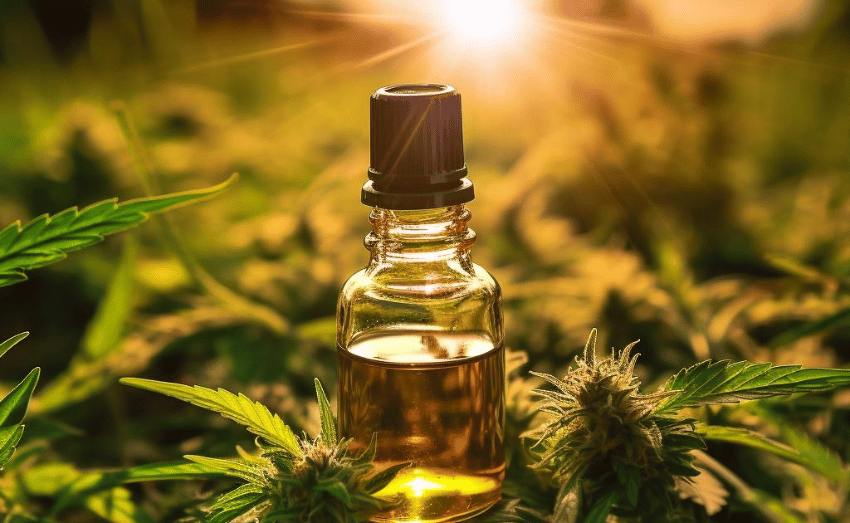When it comes to selecting a rope, especially for those who are new to this decision-making process, the price can play a crucial role. One might think that hemp rope, with its extensive range of benefits, is a costly investment. In reality, this could not be further from the truth. In this article, we’ll explore the affordability of hemp rope, providing evidence from scientific studies, research, and expert opinions to support the insights shared.
- Is Hemp Rope Expensive?
- Why Is Hemp Rope an Affordable Choice?
- What Are the Other Benefits of Hemp Rope?
- Is Hemp Rope a Reliable Investment for Beginners?
- How Does Hemp Rope Compare to Synthetic Rope?
- How to Properly Maintain Hemp Rope?
- What Applications Are Best Suited for Hemp Rope?
- Hemp Rope’s Environmental Impact
- Conclusion
- FAQs
Is Hemp Rope Expensive?
The answer is quite clear: No, hemp rope is not expensive. In fact, it is a cost-effective choice that provides a myriad of benefits without straining your budget. This affordability stems from the fact that hemp is a resilient crop, requiring minimal resources for cultivation. As per a study conducted by the European Industrial Hemp Association, the cost-effectiveness of hemp cultivation is due to its ability to thrive with minimal water and pesticides. This cost-saving aspect naturally translates into an affordable end product – the hemp rope.
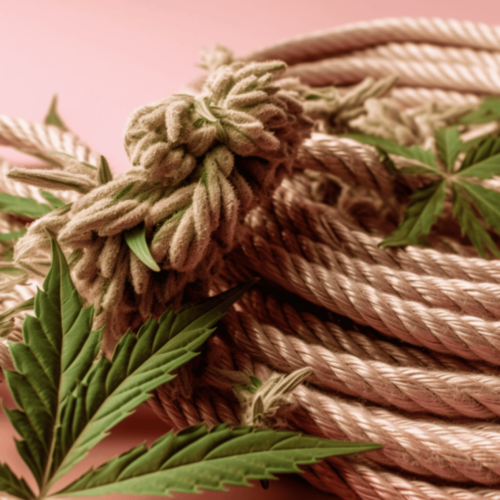
Why Is Hemp Rope an Affordable Choice?
- Low Cultivation Costs: As mentioned earlier, hemp requires less water and minimal chemical interventions for its growth. These savings directly influence the affordability of hemp ropes.
- High Yield: Hemp plants are highly productive. A single acre of hemp can produce 2 to 3 times more fiber than an acre of cotton, as cited by the National Hemp Association. This high yield contributes to the lower cost of hemp rope.
- Minimal Processing: Unlike synthetic fibers, hemp doesn’t require extensive processing. This reduces the overall production cost of hemp rope.
What Are the Other Benefits of Hemp Rope?
While affordability is a significant advantage of hemp rope, it’s important to consider its other benefits:
- Strength and Durability: Hemp fibers are among the strongest natural fibers, giving hemp rope remarkable tensile strength.
- Eco-Friendly: Hemp cultivation has a smaller environmental footprint compared to other crops, making hemp rope a more sustainable choice.
- Mold and UV Resistant: As highlighted by a study published in the European Journal of Agronomy, hemp’s natural resistance to mold and UV rays ensures a longer-lasting rope.
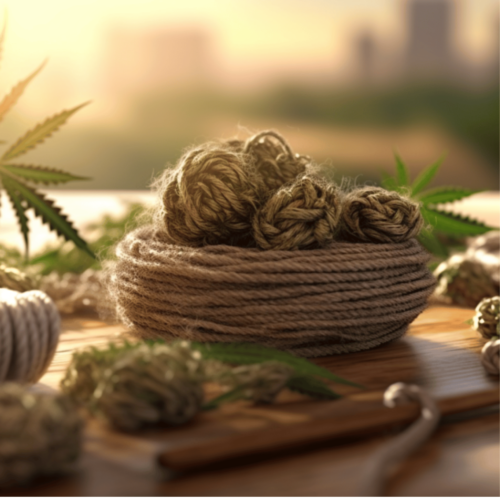
Is Hemp Rope a Reliable Investment for Beginners?
Yes, it is. Investing in hemp rope is a reliable decision, particularly for beginners. The resilience and strength of hemp rope make it ideal for a wide range of applications, ensuring that your investment will serve you well for many years to come.
Experts in the rope industry, such as Dr. Paul Mahlberg, a renowned botanist, often cite the durability and versatility of hemp rope as strong points that make it a valuable investment for beginners.
Not only is hemp rope an affordable option, but it is also a sustainable and high-quality product. Its durability, environmental benefits, and strength make it a worthy investment for a variety of applications.
How Does Hemp Rope Compare to Synthetic Rope?
When it comes to affordability and sustainability, hemp rope stands out. While synthetic ropes like nylon and polyester might have a similar price range, they come with hidden costs – both environmental and long-term.
According to the International Journal of Polymer Science, the production of synthetic fibers generates harmful by-products and contributes to environmental pollution. In contrast, hemp ropes are made from a renewable resource and have a smaller carbon footprint.
Furthermore, hemp rope offers a natural texture that provides better grip and less slippage compared to synthetic ropes. Therefore, for beginners seeking an affordable and environmentally friendly alternative, hemp rope is the superior choice.
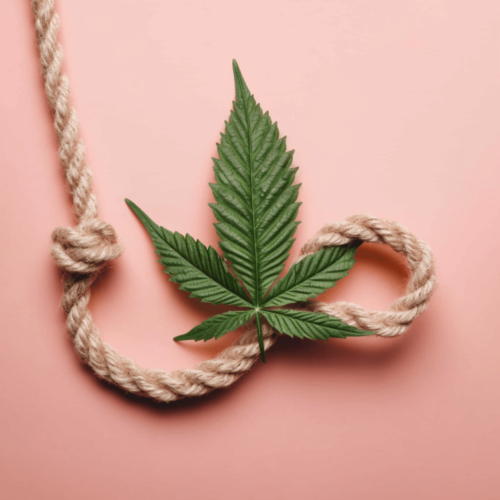
How to Properly Maintain Hemp Rope?
Proper maintenance of your hemp rope can extend its lifespan even further. Here are some tips to consider:
- Keep it Dry: Although hemp is mold-resistant, it’s still a good practice to store your hemp rope in a dry place.
- Avoid Prolonged Sun Exposure: While hemp rope is UV-resistant, minimizing direct exposure to sunlight will help maintain its strength and color.
- Regularly Inspect for Wear: Periodically check your hemp rope for signs of wear and tear.
What Applications Are Best Suited for Hemp Rope?
Hemp rope’s versatility makes it suitable for various applications:
- Marine and Nautical: Its resistance to mold and natural buoyancy makes it ideal for marine use.
- Climbing: The natural grip of hemp rope is preferred for climbing.
- Decorative and Craft: The organic and rustic look of hemp rope is popular for interior design and crafts.
- Pet Toys: The natural fibers of hemp rope are safe for pet toys.
- Agriculture: Hemp ropes are often used for tying, binding, and supporting plants.
Hemp Rope’s Environmental Impact
When it comes to making eco-friendly choices, understanding the environmental impact of the products we use is essential. Let’s dive into why hemp rope is a superior and sustainable option, especially when compared to synthetic ropes.
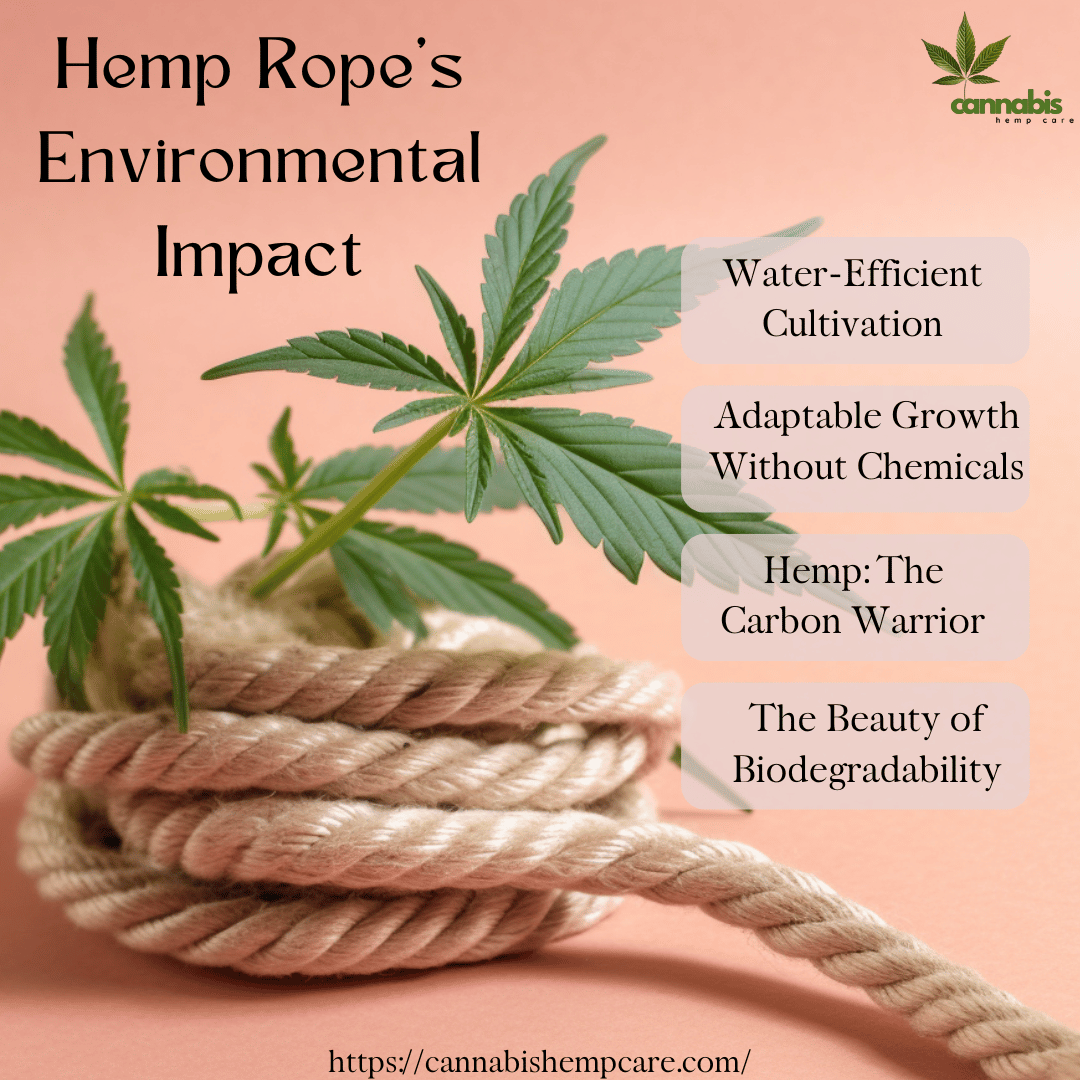
1. Water-Efficient Cultivation
Hemp is a thirsty plant, but not in the way you might think! It requires less water compared to many other crops. Imagine if you had two gardens: one filled with hemp and the other with a crop like cotton. The hemp garden would need substantially less water, making it an excellent choice in regions with water scarcity.
2. Adaptable Growth Without Chemicals
One of the superpowers of hemp is its ability to grow in a variety of soils. Whether it’s rich loamy soil or less fertile, hemp can thrive. But what’s even more impressive is that hemp doesn’t need as many pesticides or herbicides (those are chemicals that kill unwanted pests and plants). This means that hemp cultivation doesn’t add unnecessary chemicals to the earth, protecting both the soil and the waterways.
3. Hemp: The Carbon Warrior
Carbon dioxide (CO2) is a significant player in global warming. Plants absorb this gas, helping reduce its levels in our atmosphere. Hemp is a superhero in this aspect. According to research published in the Journal of Industrial Hemp, hemp plants can absorb more CO2 for every acre compared to trees. This process, called carbon sequestration, is like giving the planet a little breathing room.
4. The Beauty of Biodegradability
Everything has an expiry date, including ropes. But what happens when they’re no longer usable? Here’s where hemp rope shines again. Hemp rope, being a natural product, breaks down over time and returns to the earth, completing a natural cycle. This biodegradability means that, after serving its purpose, it doesn’t linger in landfills or clutter the environment.
On the flip side, synthetic ropes are a different story. Made from artificial materials like nylon or polyester, they can take hundreds of years to decompose fully. Imagine throwing away a synthetic rope today, and it still being around when your great-great-grandchildren are born! And as they slowly break down, they can release harmful chemicals into the soil, which isn’t good news for Mother Earth.
In a world striving for sustainability, choosing hemp rope is an eco-friendly decision. Its cultivation benefits the earth by using less water and absorbing more CO2. Moreover, its natural decomposition process ensures the earth isn’t burdened with waste for centuries. For those new to the world of ropes and looking to make an environment-conscious choice, hemp rope stands out as a clear winner.
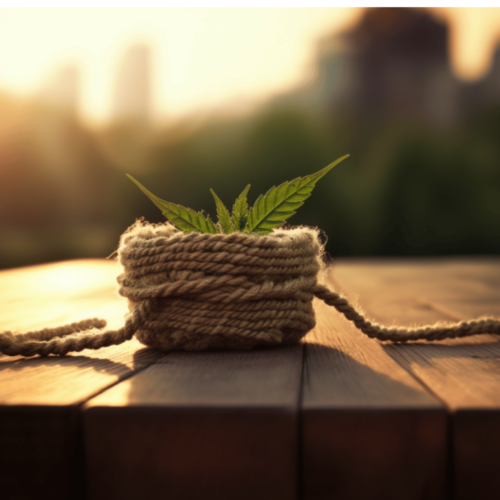
Conclusion
Hemp rope is an affordable, reliable, and environmentally friendly option, especially for beginners. Its versatility, durability, and natural properties make it an excellent choice for various applications. Proper care and maintenance will ensure that your investment in hemp rope will provide lasting benefits.
FAQs
How durable is hemp rope?
Hemp rope is renowned for its exceptional durability. Being one of the strongest natural fibers, hemp offers resistance to UV radiation, mold, and mildew, ensuring that the rope remains robust and retains its strength over time
What happens when hemp rope gets wet?
When hemp rope gets wet, it retains its integrity and does not weaken immediately as some other materials might. However, like any natural fiber, prolonged exposure to moisture can lead to deterioration if the rope is not properly dried afterward. This is why it’s essential to allow wet hemp rope to dry thoroughly to preserve its strength and prevent mold growth.
How long does hemp rope last outdoors?
Hemp rope can last several years outdoors, with an average lifespan ranging from 5 to 8 years depending on the specific conditions. Factors that affect its longevity include exposure to direct sunlight, frequency of moisture exposure, and general wear and tear. However, with proper care and storage, hemp rope’s longevity can be maximized.
Does hemp rope rot in water?
Hemp rope is resistant to mold and mildew, but it is not entirely immune to rot, especially when left in water for extended periods. If hemp rope is submerged or continuously exposed to damp conditions without a chance to dry, it can eventually start to rot. To prolong the life of hemp rope, it’s recommended to dry it thoroughly after it gets wet.
Does hemp rope smell?
Fresh hemp rope has a natural, earthy scent due to its organic origins. This aroma is not typically strong or overpowering and tends to fade over time. However, if hemp rope is left damp or in humid conditions without proper drying, it can develop a musty odor, indicating potential mold or mildew growth. Proper care and storage can prevent this.


































